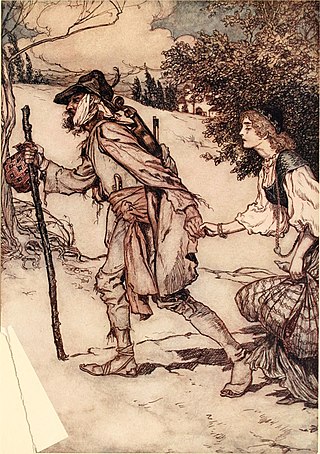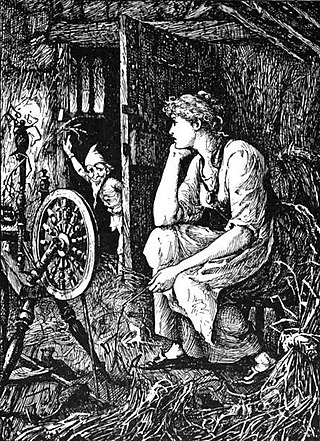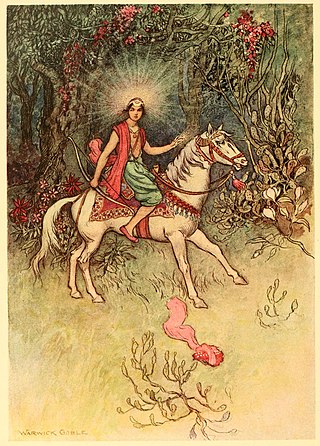
"Beauty and the Beast" is a fairy-tale written by French novelist Gabrielle-Suzanne Barbot de Villeneuve and published in 1740 in La Jeune Américaine et les contes marins.

Princess Ozma is a fictional character from the Land of Oz, created by American author L. Frank Baum. She appears for the first time in the second Oz book, The Marvelous Land of Oz (1904), and in every Oz book thereafter.

The Land of Oz is a magical country introduced in the 1900 children's novel The Wonderful Wizard of Oz written by L. Frank Baum and illustrated by W. W. Denslow.

The StoryTeller is a live-action/puppet television series that originally aired in 1987 and which was created and produced by Jim Henson.

Once Upon a Mattress is a musical comedy with music by Mary Rodgers, lyrics by Marshall Barer, and book by Jay Thompson, Dean Fuller, and Marshall Barer. It opened off-Broadway in May 1959, and then moved to Broadway. The play was written as a humorous adaptation of the 1835 Hans Christian Andersen fairy tale "The Princess and the Pea".

Queen Zixi of Ix, or The Story of the Magic Cloak, is a children's book written by L. Frank Baum and illustrated by Frederick Richardson. It was originally serialized in the early 20th-century American children's magazine St. Nicholas from November 1904 to October 1905, and was published in book form later in 1905 by The Century Company. The events of the book alternate between Noland and Ix, two neighboring regions to the Land of Oz. Baum himself commented this was the best book he had yet written. In a letter to his eldest son, Frank Joslyn Baum, he said it was "nearer to the 'old-fashioned' fairy tale than anything I have yet accomplished," and in many respects, it adheres more closely to the fairy tale structure than the Oz books.

The Frog Princess is a fairy tale that has multiple versions with various origins. It is classified as type 402, the animal bride, in the Aarne–Thompson index. Another tale of this type is the Norwegian Doll i' the Grass. Eastern European variants include the Frog Princess or Tsarevna Frog and also Vasilisa the Wise ; Alexander Afanasyev collected variants in his Narodnye russkie skazki, a collection which included folk tales from Ukraine and Belarus alongside Russian tales.

King Thrushbeard or the haughty princess is a German fairy tale collected by the Brothers Grimm. It is of Aarne–Thompson type 900.

The Langs' Fairy Books are a series of 25 collections of true and fictional stories for children published between 1889 and 1913 by Andrew Lang and his wife, Leonora Blanche Alleyne. The best known books of the series are the 12 collections of fairy tales also known as Andrew Lang's "Coloured" Fairy Books or Andrew Lang's Fairy Books of Many Colors. In all, the volumes feature 798 stories, besides the 153 poems in The Blue Poetry Book.

"The Three Little Men in the Wood" or "The Three Little Gnomes in the Forest" is a German fairy tale collected in 1812 by the Brothers Grimm in Grimm's Fairy Tales. Andrew Lang included it in The Red Fairy Book (1890) as "The Three Dwarfs," and a version of the tale appears in A Book of Dwarfs (1964) by Ruth Manning-Sanders.
Jackal or Tiger? is an Indian fairy tale. Andrew Lang included it in The Olive Fairy Book.

The Wicked World is a blank verse play by W. S. Gilbert in three acts. It opened at the Haymarket Theatre on 4 January 1873 and ran for a successful 145 performances, closing on 21 June 1873. The play is an allegory loosely based on a short illustrated story of the same title by Gilbert, written in 1871 and published in Tom Hood's Comic Annual, about how pure fairies cope with a sudden introduction to them of "mortal love."

The Snow Queen is a 2005 BBC television film commissioned by Michael Carrington that is based on the 1844 Hans Christian Andersen fairytale of The Snow Queen. Directed by Julian Gibbs, it stars Juliet Stevenson as Gerda's mother and the voice of Patrick Stewart as the raven.

"The Three Feathers" is a story by the Brothers Grimm, in their Kinder- und Hausmärchen. It is KHM nr. 63. It is classified as Aarne–Thompson–Uther ATU 402, "The Animal Bride". It appeared in the first edition in 1812, and was slightly reworked for the second edition in 1819. A second variant of the tale also collected by the Brothers Grimm is "The Poor Miller's Boy and the Cat", listed as KHM 106.

"Somebody Else's Prince" belongs to a collection of short stories, named The Other Side of the Sun, written by Evelyn Sharp (1869–1955) in 1900. Other stories in this collection include: The Weird Witch of the Willowherb, The Magician's Tea-Party, The Hundredth Princess, The Tears of Princess Prunella, The Palace on the Floor, The Lady Daffodilia, and The Kite That Went to the Moon.

"The Professor of Practical Jokes" is a literary fairy tale published in 1898 by British suffragist and author Evelyn Sharp (1829–1955). The story tells of a good yet boring king who is tricked into marrying one of his courtiers daughters, who brings excitement into his dull kingdom. The story is one of many published in Sharp's collection, All The Way To Fairyland: Fairy Stories.

The Boy with a Moon on his Forehead is a Bengali folktale collected by Maive Stokes and Lal Behari Day.
Princess Aubergine is an Indian folktale collected by Flora Annie Steel and sourced from the Punjab region. It concerns a princess whose lifeforce is tied to a necklace, and, as soon as it falls in the hand of a rival, the princess falls into a death-like sleep - comparable to heroines of European fairy tales Snow White and Sleeping Beauty. Variants exist in India, both with a heroine and a hero whose life is attached to a magical necklace.
The Anar Pari, or Pomegranate Fairy is an Indian folktale collected by Alice Elizabeth Dracott from Simla. The tale is a local form of tale type ATU 408, "The Love for Three Oranges", of the international Aarne-Thompson-Uther Index. As with The Three Oranges, the tale deals with a prince's search for a bride that lives in a fruit, who is replaced by a false bride and goes through a cycle of incarnations, until she regains physical form again. Variants are known across India with other species of fruits.

















